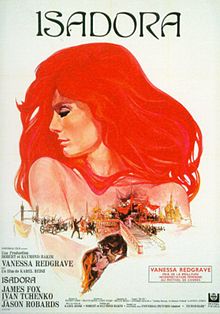
ISADORA
UK, 1968, 132 minutes, Colour.
Vanessa Redgrave, James Fox, Jason Robards, Ivan Tchenko, John Fraser.
Directed by Karel Reisz.
Isadora can be a breathtaking experience. Vanessa Redgrave, something of an Isadora-like genius herself, makes Isadora live. Ordinary mortals are continually fascinated by the stories and gossip about the geniuses of this world.
Isadora is presented as a dedicated genius, an expressionistic dancer dedicated, in Keats' words and fashion, to truth and beauty. But the film, with its flashback framework - starting with an ageing, ugly and spoilt Isadora - seems to ask whether excess is the price of genius. Despite the constant delight in Isadora's vitality and in her social and political interests, the film makes one wonder. Perhaps the chilling shock of the ending answers the questions. Isadora is suddenly and unexpectedly dead. It is all over for her, while the Riviera holiday set dance away, oblivious, to 'Bye, Bye, Blackbird'.
Near the beginning of the film Isadora quotes Nietzsche. Her genius and her amorality were 'beyond good and evil'. But, at the end of her life, when power has dwindled and passion becomes petulance, where is 'beyond'? Isadora is a typical early 19th century Romantic, with her capacity for expressing beauty and being ecstatically carried away by it. The Romantics died young. Perhaps the tragedy is that Isadora did not die young.
Vanessa Redgrave was nominated for an Oscar for her performance in 1968. She won the Cannes Best Actress award as she did for her role in a previous Karel Reisz film, Morgan. Reisz, one of the English 'kitchen-sink' producers and directors made a three hour film, but his producers cut it considerably. The men in the film are good enough, but the film 1s Isadora - Vanessa Redgrave.
1. Did you admire Isadora Duncan as a person, as a woman, as an artist? Why?
2. What was the significance of the short prologue where the child Isadora vows herself to an individualist life of dedication to truth and beauty? She quotes Keats' "Ode to a Grecian Urn" on truth and beauty and burns her parents' marriage certificate.
3. Was the flashback technique a good method for this film? well used? Isadora's flashbacks were intense but almost episodic. Was this meant to throw light on the intensity of her personality, moods and memories?
4. Was any judgment made on Isadora by showing her first as older, fat and looking for beautiful young men, dictating her memoirs while living without responsibility on the Riviera, part of the 'Bye, Bye, Blackbird' moods of the 20's?
5. Did the earlier flashbacks give you enough information and feeling to help you to understand the later Isadora - her dancing, her getting money as 'Peppy Dora', her relationship to her family, especially her brother, their European success (and Isadora's rapture at the Greek statuary in the Louvre)?
6. How did the constant return to Isadora's 1927 ageing and instability contrast with her young intensity - e.g. her fear of the tunnel, her search for the Italian driver.
7. How did Isadora's dancing give the best keys to her personality? How would you describe her dance? Did you like it? Does it explain why she had an affair with Craig (what kind of man was he?)?
8. Isadora loved her children. How did the pregnancy and childbirth sequences prove this? (And the continual memories of the children’s' death?)
9. Why did Isadora live with Paris Singer? Did she love him? Did she care for his money? Did she seem at home in his surroundings? Did she seem at home in the school (her love of children and dancing and her criticisms of strawberries and cream brought in a Rolls Royce)?
10. Why did she and Singer grow estranged? Why was the ugly musician hired? (Was this part of the film well done or exaggerated?)
11. The sequence of the children’s' death was different from all the other flashbacks. Isadora herself writes and speaks the narrative which is enacted with great dignity. How moving was this? Why?
12. What attracted Isadora to Russia in 1921? Was she a generous woman as far as schools and children went?
13. Did the difference between Russia and America come out strongly in the scene where Isadora dances for the Russian people and then they sing during the blackout?
14. Why did Isadora marry Sergei? Were they two similar 'tigers' or was she feeling her age (her drinking during the Press Conference)?
15. How effective was the sequence of the Boston concert - the dancing (did it communicate something of the meaning of the Revolution?)t the "Gospel Go-getter's" right-wing harangues, the theatre protest? What political comment was the film making at this stage? Was Isadora sincere?
16. How effective was the final sequence - Isadora's selling up, rapid changes of moods, the party, the dancing, the driver? Her death -how did it effect you? What comment did the end of the film make about Isadora?
17. Isadora was a genius, a romantic, Byronic character, living on a plane "beyond good and evil". Was excess the price of genius? And, at the end, where is "beyond"?